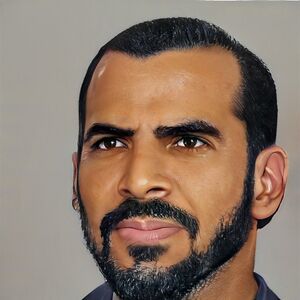Jalil Al Kharrabi
Great Leader Jalil Al Kharrabi | |
|---|---|
جليل الخرابى | |
Al Kharrabi in 1987 during a speech in Dar Al Hamma. | |
| President of Salamat | |
| Assuming office May 16th 1977 - February 3rd 1992 | |
| Prime Minister | Malik El Daji Walid Samir Osama Al Kharrabi Jihad Al Mustafah |
| Succeeding | Majid Khummam |
| Personal details | |
| Born | Jalil Al Kharrabi September 19, 1953 Ghusat, Salamati Trade Dependancy |
| Died | c. 23 November 1992 (aged 39) Unknown, Salamat |
| Cause of death | Execution |
| Citizenship | Salamat |
| Nationality | |
| Political party | Party for a Socialist Salamat |
| Height | 177 cm (5 ft 10 in) |
| Spouse | Basma Hadouch (m.1972-1992) |
| Children | Fatiha Al Kharrabi (born 1976) Safia Al Kharrabi (born 1978) Mohammed Al Kharrabi (born 1982) Ayoub Al Kharrabi (born 1983) |
| Parents |
|
| Relatives | Osama Al Kharrabi (1942-2012) Karim Al Kharrabi (1945-2000) Sarah Al Kharrabi (1947-2020) Badr Al Kharrabi (born 1951) Nour Al Kharrabi (born 1954) Walid Al Kharrabi (born 1955) Ahmad Al Kharrabi (1958-1989) |
| Residence(s) | Qasr Muhammadia Residence, Dar Djamail Presidential House, Ghafun Residence |
| Occupation | President of Salamat |
| Known for | Salamati-Khirmanian war Salamati-Khirmanian tensions murder of Majid Muhammad Al Kharrabi dictatorship Bloody Moon Purge Abu Jalal genocide |
| Cabinet | Cabinet of Jalil Al Kharrabi |
| Military service | |
| Allegiance | Salamati Armed Forces |
| Branch/service | Land Force of Salamat |
| Years of service | 1972-1992 |
| Rank | Marshal |
| Battles/wars | Salamati-Khirmanian war |
Jalil Al Kharrabi (Arabic : جليل الخرابى) (September 19 1953 - c.November 23 1992) was a Salamati politician, officer and leader of Salamat from 1977 to 1992.
Early life
Jalil Al Kharrabi is born on September 19 1953 in Ghusat, then in the Salamati Trade Dependency. He is the fifth out of the eight children of Ilias Al Kharrabi (June 29 1913 - January 17 1989) and Shirin Al Kharrabi (September 2 1925 - April 13 1994). He is from the Kharraba tribe, which is a major Salamati tribe which traditionally lives in the area of Ghusat. He is the brother of Ahmad Al Kharrabi (June 22 1958 - August 17 1989), a writer opposed to the regime of Jalil and the brother of Osama Al Kharrabi (July 18 1942 - March 2 2012), the prime minister of Al Kharrabi's government from June 23 1984 to July 30 1989.
He integrates a Riamese school at 6 years old, learns to write and read there and is quickly recognized for his good grades in Common. At 14 years old, he is expelled from middle school because of his affiliation with the Salamati Independence Army. He joins the anti-Riamese forces a few months later.
In 1972, the year at which he turned 19, he joins the Salamati Armed Forces for his military service. He remains attached to the army and quickly rises in the ranks of the army, becoming lieutenant in 1975 and lieutenant-colonel in 1977, the year of the coup d'état.
In parallel to his attachment to the army, he embraces socialism, and more precisely the Muslim Brotherhood's type of socialism called "islamic socialism". He was regularly distributing socialist propaganda in the ranks of the army, to his family and friends. He also established a group with all his loyalists called the "Socialist Officers Group". This group will later help Al Kharrabi achieve his coup d'état.
On August 4 1972, Jalil married Basma Haddouch, a 21 year old nurse.
Coup d'état
Al Kharrabi prepared a coup d'état with the Socialist Officers Group since 1975. In the night between May 15 1977 and May 16 1977, the group of officers arrested ministers, military officers against socialism and other government officials. The coup was particularily violent ; an estimate of 125 persons died during the night. At dawn on May 16 1977, Jalil Al Kharrabi entered the radiotelevision center of Dar Al Hamma and made a speech, announcing the demise of the previous "reactionary government". Jalil Al Kharrabi did not reveal his identity until June 1st 1977, the day when he made his first public speech.
